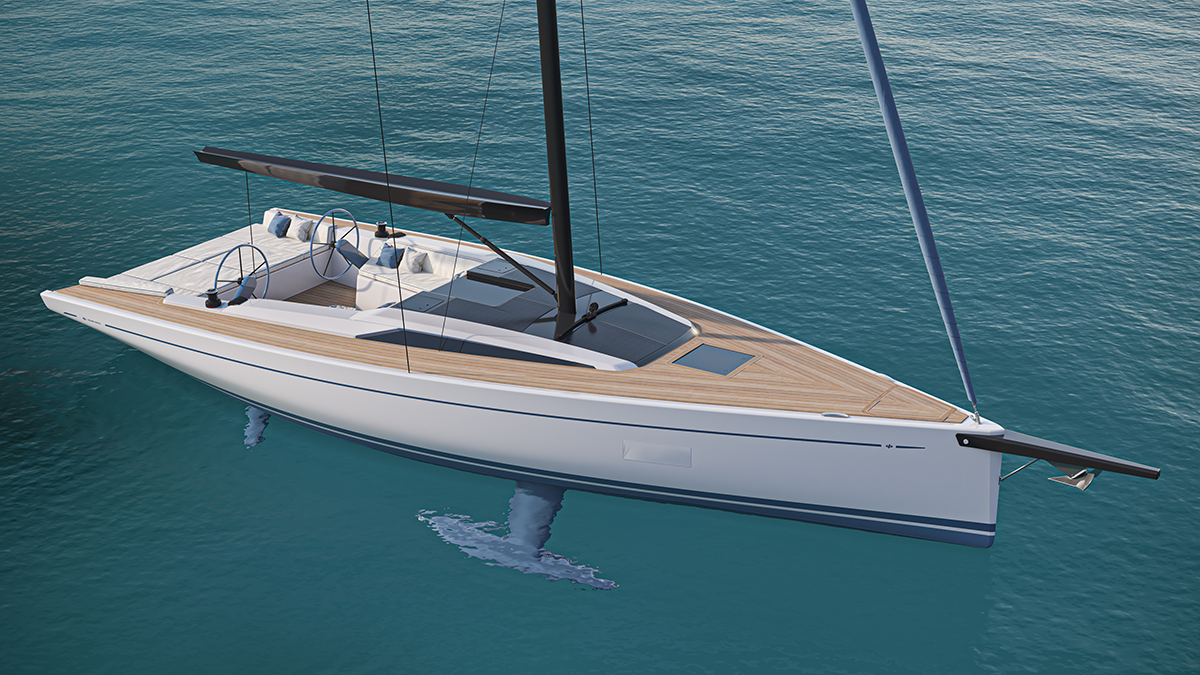Grand Soleil Yachts announces the world premiere of the Grand Soleil Blue at the upcoming Boot Dusseldorf, taking place from January 18 to 26, 2025. This new project embodies the commitment of Grand Soleil Yachts and Cantiere del Pardo to sustainability and respect for the marine environment, representing a milestone in eco-friendly yacht building.
“The sea is our passion and our home,” said Gigi Servidati, Cantiere del Pardo Chairman. “The GS Blue demonstrates how design, performance, and sustainability can harmoniously coexist, creating a boat designed for future generations”.
The GS Blue is the product of a dynamic collaboration between the yard and renowned nautical experts, such as Matteo Polli (Naval Architecture) and Nauta Design (Exterior Design, Interior Design, and G.A.), and leaders in sustainable materials like NL Comp. More than just a boat, it’s a statement of intent. With the Grand Soleil Blue, Cantiere del Pardo redefines the concept of sustainability in yachting. It also sets a new standard for future boat design, where elegance and environmental responsibility are perfectly balanced.
Measuring 10 meters in length, the Grand Soleil Blue comfortably accommodates up to four people overnight, offering a zero-impact sailing experience. At the end of its life cycle, the boat is entirely recyclable, with every component meticulously selected to ensure reusability, preventing today’s materials from becoming tomorrow’s waste. This eco-conscious approach has shaped the entire design process, resulting in a remarkably innovative and stylish weekender.
How has this been achieved?
- Sustainable construction: The GS Blue marks a turning point in boat construction by employing thermoplastic resin, a technology developed by NL Comp – a leader in sustainable yachting, a choice that addresses one of the most significant problems in the marine sector: end-of-life recycling. Traditionally, composite boats have been built using thermosetting resins, which are very difficult if not impossible to recycle. Thermoplastic resin, on the other hand, allows for easier separation of the resin and glass or carbon fibers for re-use or eco-responsible disposal.
- Design for disassembly: A smart design approach allows easy separation of boat accessories and components, similar to end-of-life practices in the automotive industry. This critical process ensures that every part of the GS Blue can be effectively disassembled and recycled, minimizing environmental impact.
- Lithium Batteries: The GS Blue will be equipped with an 8 kW, 48V lithium battery bank (LiFePO4) from E-Propulsion, which can be recharged in 7.2 hours. This is the standard configuration, but the storage capacity can be doubled without increasing charging time, as the charger compensates for the larger battery capacity, maintaining the same recharge time.
- Electric propulsion: The GS Blue features a 6 kW electric motor with a direct Pod Drive transmission from E-Propulsion. This compact, low-maintenance solution ensures absolute silence onboard and a plug-and-play installation. Ideal for zero-emission navigation, it promotes a more sustainable future by reducing environmental impact.
- Solar panels: The installation of solar panels provides renewable energy autonomy by recharging the battery bank feeding the electric motor and supporting onboard services. With the standard battery pack, the GS Blue can cruise for 30 nautical miles at approximately 5 knots, translating to 6 hours of continuous motor operation or 12 hours with the doubled battery pack. The integrated photovoltaic system, made by Solbian with around 340 W of power, is fully incorporated into the deckhouse, walkable, and features a non-slip finish. This system not only recharges the motor battery but also transfers excess energy to the service battery bank, ensuring optimal charge balancing for overall energy efficiency.
- Thermoplastic Sails: In line with the project’s sustainable philosophy, the sails are made from thermoplastic materials, further committing to reducing environmental impact. Developed by OneSails, the 4T FORTE™ sails are the world’s first “green sails.” Their membranes and assembly process are designed to meet the highest standards in terms of environmental impact and recyclability. Traditional glues, resins, and solvents have been replaced with an innovative hot-melt process, while the base polymer is 100% recyclable through standard waste disposal methods.
- Hydrogeneration: While sailing, the E-Propulsion Pod Drive motor efficiently recharges the GS Blue’s batteries through hydrogeneration—the flow of water generated by the propeller’s movement as the boat sails. This system ensures a minimum recharge of 250W even at a speed of about 6 knots.
